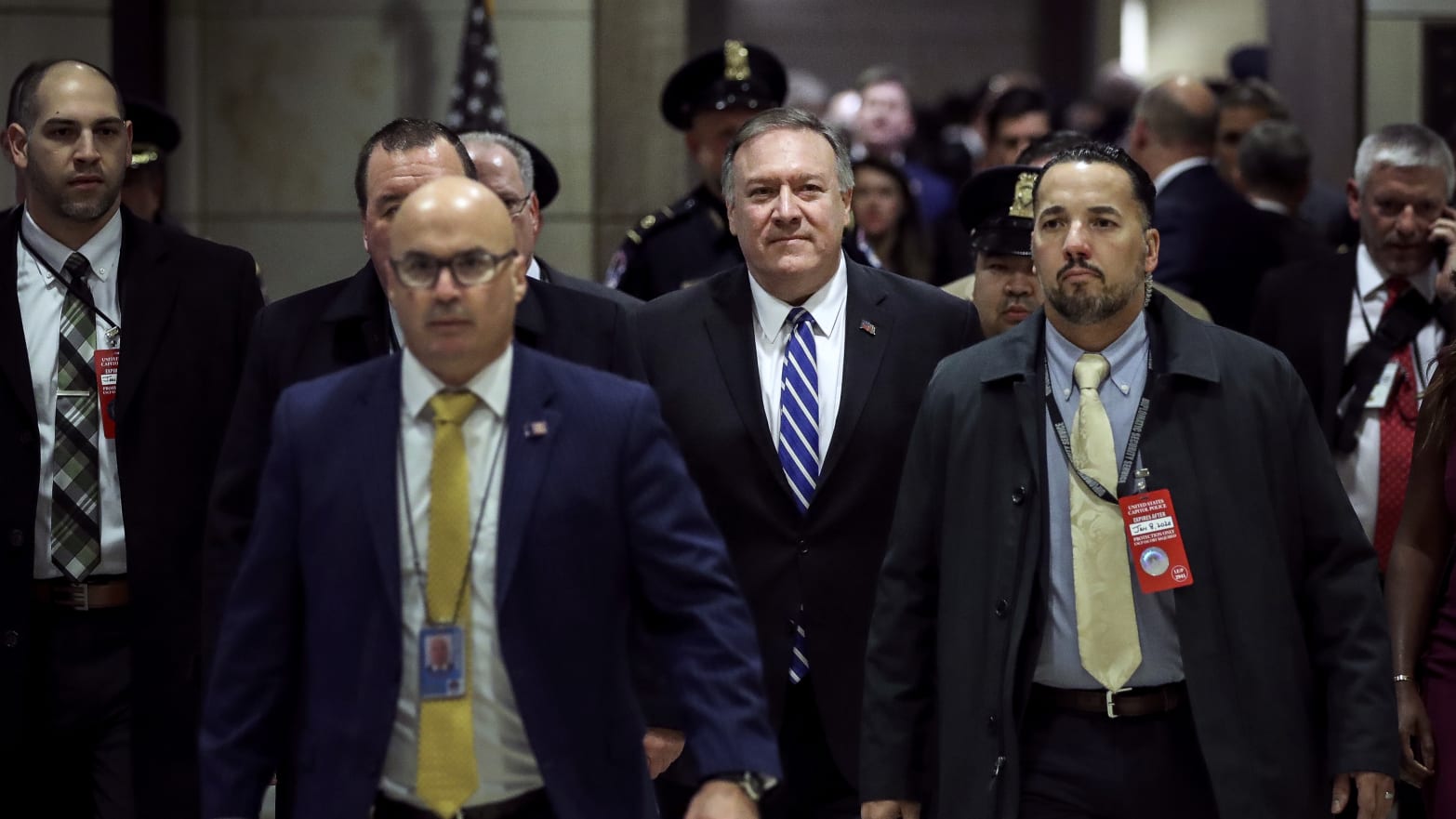A day after Iranian ballistic missiles hit Iraqi bases used by U.S. forces, the Trump administration’s first briefings on Iran for legislators went so poorly that even its allies walked out saying that the White House was losing congressional support.
At a moment when the Middle East is asking if the U.S. and Iran can avoid confrontation, senators and representatives said that briefings from Secretary of State Mike Pompeo, Defense Secretary Mark Esper, CIA Director Gina Haspel, Gen. Mark Milley, chairman of the Joint Chiefs of Staff, and acting Director of National Intelligence Joseph Maguire were risible in their lack of detail concerning core concerns, including the intelligence behind the killing of Iranian general Qassem Soleimani and the future course of U.S. strategy against Tehran. Meanwhile, briefers also raised concerns that U.S. forces in Iraq could face heightened threats from Iran-allied Shiite militias in the wake of Soleimani’s death.
Sen. Mike Lee, a libertarian-leaning Utah Republican who rarely breaks with Trump, exited the Senate’s briefing calling it “the worst briefing on a military issue” he’s seen in nine years in Congress. It was “insulting,” Lee said—so much so that he will now support a measure to curb Trump’s authority to wage war in Iran after hinting a day before that he’d vote.
“They had to leave after 75 minutes, while they’re in the process of telling us that we need to be good little boys and girls and run along and not debate this in public,” Lee said. “I find that absolutely insane. I think it’s unacceptable.”
One Senate Democratic source read in on the meeting said Pompeo acted like “Benghazi Mike” in the briefing—a reference to Pompeo’s incendiary performance as a congressman during the 2015 Benghazi hearings—and was often defensive when faced with tough questions about the intelligence that led to the killing of Soleimani.
At least one Republican came to the briefers’ defense and blamed Democrats for causing the chaos.
Sen. Lindsey Graham (R-S.C.) said the briefers made a compelling case. In response to Democrats’ assertions that it was vague, he responded: “They don’t want specifics. I was really disappointed at their behavior in there.”
House Democrats, meanwhile, said they had anticipated some stonewalling in their briefing. In the caucus meeting Wednesday morning, members sought advice from former Undersecretary of State Wendy Sherman about how to press the Trump administration officials for details on what led to the Soleimani strike, according to a source in the room. Sherman warned that the House would likely get the runaround, that source said.
“It was disappointing,” said Rep. Mike Quigley, an Illinois Democrat on the Intelligence Committee, adding that “there was acrimony” in the room. Still, Quigley cautioned that anyone expecting much out of the briefing probably “had unreasonable expectations going in.”
Legislators’ bitterness over the briefing recalled the Obama administration’s 2013 briefing on Syria that made it clear Congress would not let Obama bomb Iranian ally Bashar al-Assad.
“There were many times when many members tried to ask for more detail on any intelligence, any threat assessments, and really, there was nothing that we heard there that you don’t know,” said Rep. Pramila Jayapal (D-WA).
Briefers wouldn’t go into specifics, and members were visibly frustrated. “People were basically yelling at them to give an answer,” an attendee said. Other attendees said “yelling” overstated the reaction, though participants made audible noises indicating dissatisfaction.
Rep. Mark Meadows, a North Carolina Republican, told reporters that the first question to briefers on the House side concerned the legal basis for the strike. As National Security Adviser Robert O’Brien said on Friday, Justice Department officials told legislators the authority flowed from the 2002 congressional authorization to topple Saddam Hussein’s former regime, the legal wellspring of the 2003-2011 invasion and occupation.
Sources also said the briefers invoked Trump’s Article II authority as commander in chief—which will rely on the pre-strike threat being an imminent one, if Congress grows more assertive in insisting on its war powers.
Over the past five days, the Trump administration has backed off its assertions that killing Soleimani was intended to foil an “imminent” attack. Jayapal said there was “no raw evidence” provided of any imminent pre-strike threat.
“I went into this briefing looking for something specific to back up the claim that there was an impending threat against Americans or American interests. Speaking for myself, I’m nowhere close to convinced that this is a real thing,” said Rep. Jared Huffman (D-CA).
Just as dissatisfying to legislators in attendance was a minimal indication of where U.S. strategy against Iran goes next. While both Iran and Trump have indicated they want to avoid wider conflict, Trump on Wednesday morning placed additional economic sanctions on Iran, intensifying a punitive strategy that has yet to change Iran’s behavior.
One member who spoke with The Daily Beast also said Pompeo reiterated his assurances that he is willing to talk with the Iranians anytime and anywhere, and will travel for a potential meeting–something the Iranians have neither sought nor accepted. There was also a back-and-forth with briefers about Iranian retaliation for the killing of Soleimani.
“What are our top priorities with Iran? That's a pretty fundamental piece of the puzzle,” said a person in the room. “You're gonna have a strategy. I mean, we can have a debate about whether [the administration] is on the same page with the details, but they can't even get on the same page with the top line priorities.”
“I didn't learn anything new. And that's too bad because they had an opportunity to really educate us,” said Rep. Raja Krishnamoorthi (D-IL), an intelligence committee member.
U.S. intelligence officials have also expressed concerns that Soleimani’s death could mean Iraqi Shiite militias pose a greater threat to American troops—even as Trump administration officials have said the killing left the world more secure.
The officials highlighted their concerns in congressional briefings. In one of those briefings, according to a congressional source with knowledge of the comments, an official indicated that Soleimani was somewhat of a check on the Shiite militias, and that no one else carries the same weight to keep them from operating without a strategy–and from potentially targeting American forces.
Three additional sources familiar with classified briefings on tensions in the region confirmed that U.S. intelligence officials have highlighted concerns about heightened threats to U.S. troops in Iraq from Shiite militias in the wake of Soleimani’s death.
Rep. Don Beyer, a Virginia Democrat, has also echoed those concerns.
“I am far more concerned about the danger of Shiite militias, especially because of the killing of Abu Mahdi al-Muhandis, which has gotten far less attention but may lead to additional reprisals against our people there,” he told The Daily Beast.
In contrast, Secretary of State Pompeo recently declared that “the world is a safer place” because Soleimani is dead. And Vice President Mike Pence told CBS News that U.S. intelligence shows Iran has asked militias not to target American troops.
-- with reporting from Erin Banco



